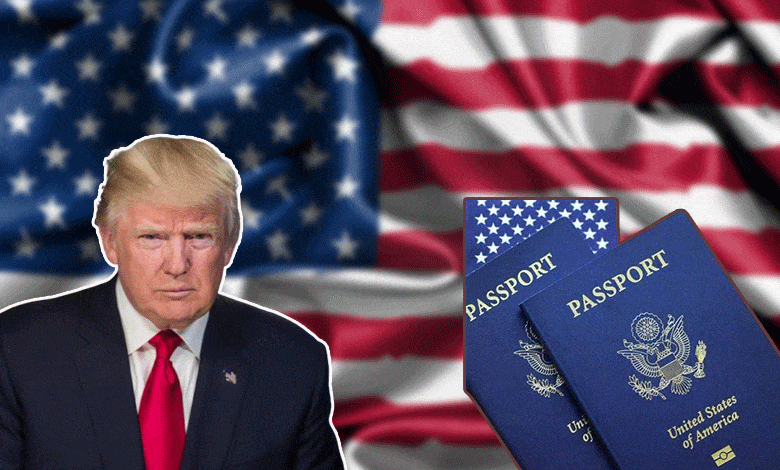Passport applications got more complicated for transgender Americans under new Trump policy
A new policy introduced by President Donald Trump has created significant challenges for transgender Americans seeking to update their passports, especially for those who wish to have their gender accurately reflected.

A new policy introduced by President Donald Trump has created significant challenges for transgender Americans seeking to update their passports, especially for those who wish to have their gender accurately reflected. The executive order, signed by Trump on January 20, 2025, limits the gender classification on official documents to male or female, disregarding the identity of transgender, nonbinary, and intersex individuals.
Table of Contents
Trump’s Executive Order Targets Transgender Recognition
The executive order signed by Trump aligns with conservative views that reject the concept of transitioning between genders. It specifically limits official documents to the sexes of male and female and disallows the recognition of a person’s gender identity, which has created confusion and distress among transgender Americans. This policy contradicts the stance of major medical groups and prior policies under the Biden administration.
For many transgender Americans, including Mellow, a 21-year-old transgender woman from Norfolk, Virginia, the policy is deeply concerning. Mellow’s family is now uncertain about the potential legal hurdles she may face when applying for a passport, especially if her identity is not accurately reflected in official documents.
State Department’s Compliance with Trump’s Order
Following the executive order, the State Department stopped issuing passports with an “X” gender marker, a feature preferred by many nonbinary individuals. They also halted gender marker changes on passports, leaving people in limbo as their applications are delayed or rejected. Previously submitted applications requesting gender changes have been put on hold, causing additional frustration for transgender and nonbinary individuals.
In an effort to comply with the policy, the State Department revised its informational pages for LGBTQI+ travelers, omitting any reference to transgender or intersex people and instead referring only to “LGB.”
Legal Challenges to the New Policy
In response to the new rules, a group of transgender individuals, including Lisa Suhay’s daughter Mellow, filed a lawsuit challenging the policy. The lawsuit, which was filed in Boston, argues that the policy violates the rights of transgender people to equal protection, privacy, and freedom of speech. The plaintiffs also claim that the sudden implementation of the policy bypasses the necessary 60-day notice and comment period required by law.
Impact on Transgender Americans’ Ability to Travel
The changes in the passport policy are expected to create significant challenges for transgender individuals, especially when traveling internationally. Transgender and nonbinary travelers may face difficulties when returning to the U.S. if their passports reflect an “X” gender marker or incorrect gender identification.
Elise Flatland, a mother from Olathe, Kansas, has yet to receive a passport for her 12-year-old transgender son, whose application has been delayed despite the rest of the family’s applications being processed. Flatland emphasized the importance of having a passport for international travel, particularly for her son’s gender-affirming care abroad, which may soon be inaccessible in the U.S.
The Emotional Toll of Passport Application Changes
For many transgender individuals, the passport process is emotionally taxing. Mellow, for instance, checked the “male” box on her application despite her true identity being female, as required by the new policy. The experience left her feeling as though she had been forced to lie to herself in order to comply with the regulations.
In the case of Zaya Perysian, a 22-year-old content creator from Los Angeles, her attempt to change the gender marker on her passport resulted in her new passport being issued with the wrong gender marker. A letter accompanying the passport stated that her application had been “corrected” to male, which Perysian believes is part of an ongoing effort to invalidate transgender people’s identities.
What Lies Ahead: Legal and Social Struggles
Also Read: Trump Revokes Joe Biden’s Security Clearance in Retaliation for 2021 Decision
The Trump administration’s policy changes are part of a broader effort to restrict the rights and recognition of transgender, intersex, and nonbinary people across various sectors, including housing, military service, and access to gender-affirming care. With the lawsuit now filed, transgender rights advocates are hoping the courts will reverse the policy and restore the ability for transgender individuals to have their gender accurately represented in official documents.

As the legal battle continues, many transgender Americans are left uncertain about their future travel plans and the continued recognition of their identities. The outcome of the lawsuit will have lasting implications for the transgender community and their ability to live authentically in an increasingly polarized political landscape.
